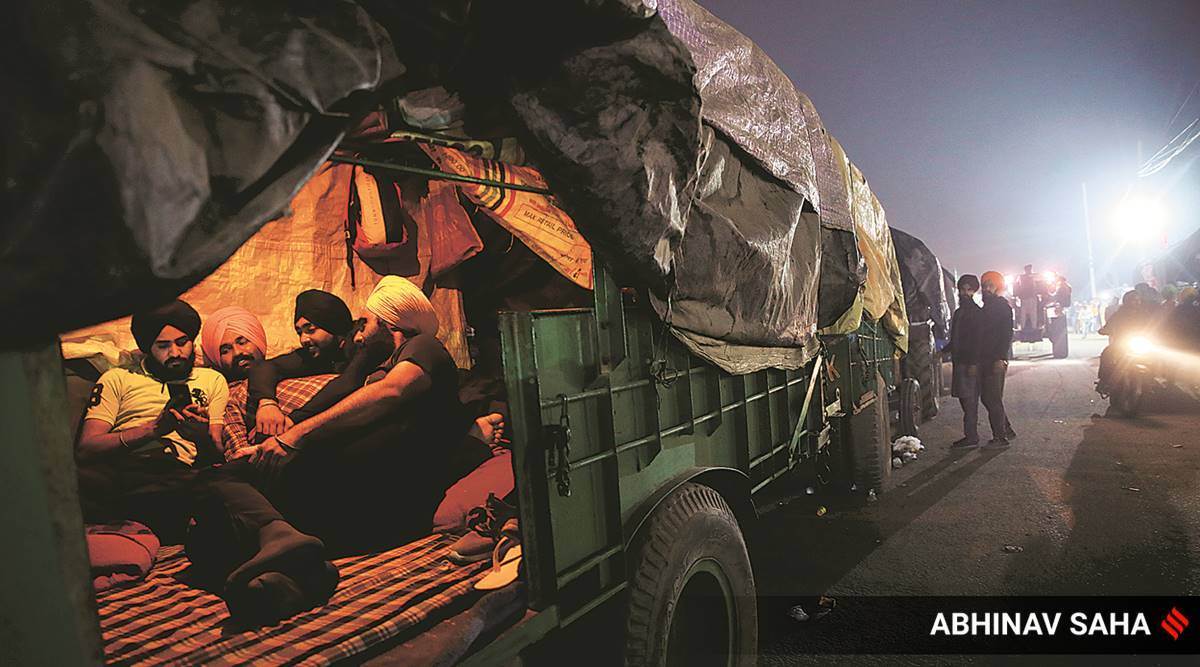 A group of farmers at the protest site at the Singhu border, in New Delhi. (Express photo by Abhinav Saha/File)
A group of farmers at the protest site at the Singhu border, in New Delhi. (Express photo by Abhinav Saha/File) When B R Ambedkar insisted on inclusion of “fraternity” in the Constitution of India, he first elaborated upon the meaning of it, which is a sense of common brotherhood of all Indians being one people. Reflecting upon Ambedkar’s words on India’s 72nd Republic Day resonates with India’s glorious past, albeit with trials and tribulations. With pride, Indians want to express their fervour for the idea that is India, as one people. However, many so-called flag-bearers of constitutional morality now brand doing so as “chest-thumping” nationalism.
Slogans that have invoked brotherhood and solidarity since times immemorial are now termed “war cries” by those who consider themselves as knights in shining armour, as if only they are allowed to define the idea of India.
There have been critical moments in the past when national interest has required a strong sense of oneness and a united voice. However, even at these critical junctures, a small but vocal minority has refused to keep aside vested political interests and ended up compromising national interest. Recall what happened when India took a tough stand against cross-border terrorism and conducted surgical strikes against Pakistan-based terrorists. While the majority was elated with the tough stand and spoke in one voice in support of our bravest, there were many who joined the neighbouring country’s chorus and asked for proof for the surgical strikes. Talk about preachy write-ups and speeches on Constitution and integrity!
The foremost example of their typical “oblivion meets convenience” pedagogy is the Kashmiri Pandit exodus of 1990 and the cow slaughter ban. The outrage of the so-called knights never saw the light of day when the voice of Pandits recalled the spine-chilling slogans of “Raliv, Galiv ya Chaliv” (convert, die or leave). Conveniently, the Kashmiri Pandit exodus was dropped (and continues to remain dropped) from the “list” of atrocities that they vividly claim to describe in Kashmir. When the abrogation of Article 370 was finally carried out after years of appeasement ended, Indians welcomed it with open arms. Kashmir is already on the path of unbridled development and change. Similarly, it is forgotten at leisure that it is the Constitution, which specifically strives for a nation where cow slaughter is prohibited.
With protests repeatedly turning violent and disrupting everyday life for thousands of citizens, protesting has taken a whole new meaning – siege and violence. Though dissent is a safety valve of democracy, it is often perplexing to watch the arteries of the valve burst, as sympathy for an agenda that weakens the country eventually overshadows the publicly stated reason for the protest. Many public intellectuals have written articles on the power of national unity and accommodating diversity. However, that has not prevented them from extending unconditional support to protests that rely on misinformation to advance vested political interests and hamper national unity.
The ongoing farmer protests are a good example of this phenomenon. Activists and farmer union leaders have tried to construct a movement by tirelessly repeating a misinformation — the end of minimum support price and public procurement of food grains. In this process, not only have they deceived farmers across the country but also undermined national unity by allowing Khalistan sympathisers on their platform.
Desecration of the Tricolour at the Red Fort on Republic Day is one of the many instances when protests that claimed to protect constitutional values have ended up targeting the country’s honour. Protestors who deceive the masses, turn violent, attack the police, hold an entire city on siege, or take support from forces that aim to weaken the country cannot be sympathised with. One fails to understand how such activism upholds constitutional morality and fosters national unity.
Erroneous comparisons of great proportions have been drawn between Nazi Germany and India. These methods are old and repetitive (also, boring!). For starters, it is almost unimaginable that in a totalitarian state, articles critical of the government would be published, that too on a day as important as Republic Day. The very fact that several authors can share their views and put forth sharp criticism demonstrates that free speech remains unhindered. India is no totalitarian state, no matter how hard a certain lobby tries to portray it as one.
The same deflated ecosystem consistently dissents, protests, and engages in a discourse, often with a singular thought process, without much room for discussion apart from their solidified “idea” of Constitution and morality. Every other opinion, which deviates from their idea of India, is automatically branded as “fascist”, a “lie” or even “anti-constitutional”.
This ecosystem, with several eminent lawyers who consider themselves the crème de la crème of freedom of speech, forgets that the death knell of the very idea of the Constitution was sounded when the Emergency was promulgated in 1975. This fact is conveniently omitted because it does not suit the narrative they choose to adopt.
Undeniably, no picture is perfect and as we celebrate our 72nd Republic Day, we need to acknowledge the problems our country faces. Poverty, hunger and malnutrition are issues which plague our society. These impediments did not arise in the recent past but have plagued the country for many decades. To solely and consistently blame a government which has been elected twice is no more than a salutation to this blatant ignorance. This not only reveals a partisan agenda but also diverts attention from constructive problem solving.
All societies have a few naysayers and pessimists, but the rest must continue to march on.
The writer is a senior lawyer based in Mumbai